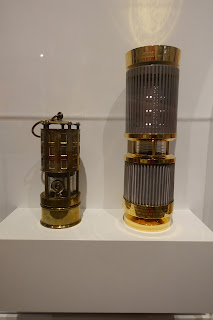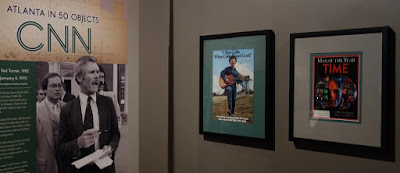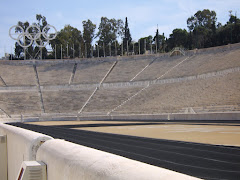 |
| Atlanta History Center |
After additional visits on both opening day and Sept. 19, and more than two months of percolating on observations, the new space remains at once pleasing and perplexing for this blogger. Here's a video the museum posted to describe the experience.
What follows is a blend of the good stuff (the exhibition is definitely worth a special visit) and items I think would help improve on a solid presentation.
New surprises and what I liked:
- Clean and classy lines of the timeline displays with the Modern Games' and Atlanta's history on parallel tracks from 1896 to 1996 and beyond
- Views of the original mock-up for Atlanta's hardbound bid publication, reminiscent of Miranda Priestley's dummy magazine copy known as "The Book" in "The Devil Wears Prada"
- First look at a rare, custom-designed Cabbage Patch Doll with pin stripe suit and leather briefcase presented to voting members of the International Olympic Committee
- The impressive hand-painted original model for architect Siah Armajiani's Olympic Bridge and Cauldron, a functional sculpture that did not reach the potential of its sister structure in Minneapolis
- Original artwork -- a massive, colorful canvas -- painted by the athletes of the XXVIth Olympiad in the athlete village at Georgia Tech
- Discovering one extremely rare "Olympic Quilter" pin given to the artisans who stitched up content for the Cultural Olympiad. An equally rare prototype or unreleased pin featuring mascot Izzy carrying a Georgia state flag (circa 1996) also took me by surprise
- First look at the set of custom miner's lamps used to transport the Olympic flame from Greece and to many points across the U.S. during the epic 1996 Olympic Torch Relay
- One of the authentic "Info '96" interactive kiosks touting IBM technology and the first official website for a host city
- Displays about important community leaders and the regional causes they championed, providing context for the against-all-odds proposal the Atlanta bid team brought to the city during the later 1980s
- Touchless interactive video players that "talk to the hand" of visitors who wave or make fists to select and play archived content (perhaps the state's first museum to use this technology)
 |
| Atlanta History Center |
- All of the feels from viewing footage of Olympic champions' "one moment in time"
- An oversized photo of my longtime friend and mentor cheering at Underground Atlanta moments after IOC President Juan Antonio Samaranch announced the Games are awarded to the city of ... At-lan-ta!
What I miss (or hope they'll bring back over time):
- Video of the aforementioned announcement by J.A. Samaranch, a glaring omission given the local-to-global impact of that moment in the arc of Olympic and the city's history (others alive in 1990 still get goosebumps and sentimental tears watching that Tokyo moment -- am I right?). This, for me, was the biggest "duh!" oversight that could have easily appeared as it did in the previous Olympic section. Why leave out one of the city's proudest, most historic and gleeful moments captured on global news broadcast by hometown network CNN? My only guess is this has to do with exhibition planning by folks who themselves were not eyewitness to Atlanta's global debut that even included the Atlanta History Center in the official bid video
- More of the 1988 to 1990 Atlanta bid mementos (specifically the rarest of the "Circle of A's" bid pins in the form of a gold, silver or pewter women's brooch). A lot of space was used to create a map of bid cities, but the pins incorporated are 'meh' while their collection likely has other hidden gems in storage
- Any one of the Olympic Orders presented to Atlanta organizers (these are the rarest of Olympic honors, and Billy Payne's is apparently on loan, but what about Ambassador Andrew Young's?). Even the Yeltsin Presidential Center in Yekaterinburg, Russia, displays their hometown hero Boris' Olympic Order! (In that nation's language the translation of "duh" is "да" or "yes!")
- The complete (or nearly complete) collection of summer Olympic torches, another rare bragging opportunity in storage (to the Atlanta History Center's credit, they do display several summer Games torches). I learned they may not have one of the rarest summer torches, but even a "complete collection minus one" or "complete collection*" with a asterisk would be marvelous. This link includes a photo of the previous museum torch display that's now history.
- The museum's signed version of "Summon The Heroes" sheet music autographed by Oscar and Grammy-winning composer John Williams (back in storage?)
- Touchless database of 1996 Olympians (or at least the medal winners). Bonus option would be a database of all the volunteers listed in the margins of every page of the Games' "Official Report"
- The model of the Atlanta Olympic Village that was on view for years (including many months of pre-installation of the new signature exhibition). This could easily fit inside the "glass fence" protecting the enormous athlete-painted canvas, complementing the Olympic Stadium model only steps away. By the way, athletes added to the painting in the "international zone" of the Village (the model portrays this zone).
Also missing are obvious photo opp or selfie-bait spots on which to stand atop the medals podium or hold a '96 torch. This could be easily remedied with a life-sized cutout of any torchbearer or moving a medals podium from storage to the ample corridor facing the exhibition.
From my view, with only 2,600 square feet available, too much space is filled with anti-Games elements. I liked a look at the successful efforts of few in response to Cobb County government, but did it deserve as much square footage as a nearby Cultural Olympiad showcase? It is important to acknowledge this history, of course, but do visitors need floor-to-ceiling displays on the movements that rode the Games' coattails? (Answer: I don't think so.)
And while another rafters-to-carpet photo shows group prayers in the wake of the Centennial Olympic Park bombing, visitors almost need a magnifying glass to find mention of Richard Jewell, whose image does not appear anywhere in spite of saving countless lives (this feels like another missed opportunity to reshape incorrect history). But, hey, the protesters who got the Games out of Cobb County are heroes, too. Their photo does appear.
The bottom line is the Atlanta History Center's new signature Olympic exhibition marches to its own drum where other Games museums stick more to a traditional sports museum format.
With that stated, in spite of a few missed beats, five-ringed fans should check it out. For those who cannot get enough of Atlanta's Olympic history, you may enjoy a trio of thorough blog posts about the Atlanta Games by Sarah Dylla, who worked hard and delivered the points to ponder in this five-ringed exhibition. Dylla also shared more in a conversation aired on WABE-FM's "City Lights with Lois Reitzes." Visit AtlantaHistoryCenter.com or call 404-814-4000 for ticket and other visitor information.
Photo credits: Atlanta History Center where noted. All other images by Nicholas Wolaver.





































































